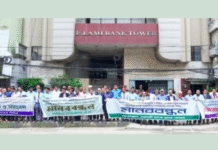
The government on Monday signed a $210 million financing agreement with the International Development Association (IDA) of the World Bank to construct a modern food storage system capable of feeding 10 million people.
ERD additional secretary Arastoo Khan and Christine Kimes of the World Bank signed the deal at the ERD on behalf of their respective sides.
The credit from the IDA has a 40-year term, including a 10-year grace period, and carries a service charge of 0.75 percent.
The Modern Food Storage Facilities Project will construct steel silos with a storage capacity for 535,500 tonnes of rice and wheat and also support the distribution of smaller household silos to 500,000 households in disaster-prone coastal areas.
“Bangladesh faces floods and cyclones almost after every three years, and climate change could increase the frequency and intensity these extreme-weather events,” said Christine Kimes, Acting Country Head, World Bank Bangladesh.
“This modern food storage system, combined with an effective distribution system, will help to ensure food security immediately after a natural disaster. The project will reduce the vulnerability of people living in natural disaster prone areas and help Bangladesh build a stock of food to meet emergencies,” added the World Bank official.
The modern steel silos will be able to store food grains for up to three years while retaining the nutritional quality of the rice through computerised control of humidity and temperature. The flat-bottomed steel silos can be constructed quickly and occupy much less space than conventional concrete warehousing. In comparison, traditional concrete warehousing can store grains only up to a maximum of one year.
The project will also provide domestic silos for grain and seed to around 500,000 households in flood and cyclone-prone coastal areas to ensure food security during and after natural disasters.
Manufactured in Bangladesh, these household-level silos, or grain storage bins, are specially designed 70-liter, food-grade plastic bins with a watertight lid that prevents water intrusion from surges and floods. The bins can hold about 40kg of paddy.
“The steel rice and wheat silos would offer enhanced shelf life of rice and wheat from seven months to three years. This would protect the government from having to replenish rice and wheat stock after every seven months with huge cost. The government would have greater maneuverability in management and distribution of cereal stock,” said Arastoo Khan.
The project will also support the improvement and modernisation of the monitoring and management system of food stocks in the country, as well as the development of a food policy research programme, and provide project management support, supervision and technical assistance and training.
Source: UNB Connect









